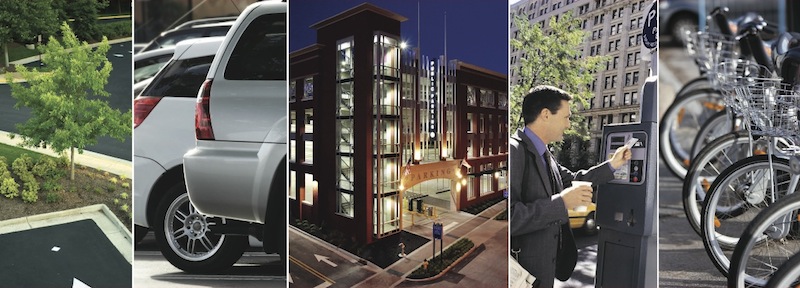According to the results of a just-released survey, the country is undergoing a parking revolution as the industry embraces a variety of new technologies that make it easier for people to find and pay for parking, and for parking authorities to better manage it.
The 2013 Emerging Trends in Parking survey was conducted among members of the International Parking Institute (IPI) and released at the 2013 IPI Conference & Expo, May 19-22. Cities leading in parking innovation include San Francisco; Seattle; New York; Los Angeles; Washington, D.C.; Portland, Ore; Miami; Houston; Boston; Denver; Pittsburgh; and Tampa. Dozens of other cities were identified.
Survey highlights include:
1. Smartphones: Solution to the "space race?"
Topping the list of trends in the $30 billion parking industry is the "move toward innovative technologies to improve parking access control and payment automation," cited by 59 percent of respondents. Another top trend is "real-time communication of pricing and availability to mobile/smart phones" (52 percent).
Both trends are evident in San Francisco's federally-funded SFpark pilot project, which supplies real-time information on the availability and cost of on- and off-street parking, drastically reducing driver circling while hunting for open spaces, congestion, and double-parking.
According to San Francisco County Transportation Authority Park Manager Jay Primus, the city also may be the first in the U.S. to quantify the number of available parking spaces in all public lots, garages, and city blocks. Seattle's new electronic parking guidance system uses dynamic real-time message signs and web information to direct people to available off-street parking at six downtown garages.
2. Payment options continue to expand
The second leading trend is the demand for electronic (cashless) payment, with cities such as Washington, D.C., Pittsburgh, Houston, and Miami, among others, incorporating pay-by-phone programs. Acclaimed as the world's most successful of its type, the D.C. program has earned 550,000 customers and accounts for 40 percent of the city's parking revenues.
About 80 percent of the seven million transactions to date employ smart phones, with payment options that include credit cards, online and mobile money management solutions, and PayPal. Miami and Pittsburgh are among the pioneering cities in incorporating license-plate recognition technology as another means of quick and efficient payment.
3. Taking a smarter business approach
The trends toward "demand for greater parking revenue" (38 percent) and "more public-private partnerships" (24 percent) are demonstrated by Miami's innovative public-private partnerships. Similar programs have been launched in cities such as Houston, where consultants posed the question: "What would a parking program look like if it was managed by Nordstrom?" prompting a focus on parking as an engine for municipal economic development.
4. Green solutions sprouting up
Other notable trends include "collaboration between parking, transportation, and decision makers" (43 percent), "need for improved customer service," (31 percent), and "demand for green/sustainable solutions" (30 percent). Among the technology considered to have the greatest potential in improving sustainability are "guidance systems to enable drivers to find parking faster (and reduce carbon emissions)" (57 percent); "energy-efficient lighting" (55 percent); "encouraging alternative travel" by providing bike storage, car/bike share, access to transit, etc. (42 percent); "accommodating electric-vehicle charging stations: (21 percent), :renewable-energy installations such as solar panels and wind power"; and "innovative water and storm water management systems" (11 percent).
For example, the City of Tampa cut its energy costs in half by upgrading lighting in its parking facilities, joining Miami, Denver, and other cities in offering citywide electric-vehicle charging stations. Miami was among the first U.S. city to partner with a car-share program, which has since taken root in a number of other cities across the country.
Related Stories
| Jan 31, 2013
More severe wind storms should prompt nationwide reexamination of building codes, says insurance expert
The increased number and severity of storms with high winds nationally should prompt a reexamination of building codes in every community, says Mory Katz, vice president, Verisk Insurance Solutions Commercial Property, Jersey City, N.J.
| Aug 28, 2012
McCarthy begins construction on transportation center at Bob Hope Airport
Designed to meet LEED silver certification standards, the facility will feature unique, above ground base isolators that will resist a maximum credible earthquake.
| Jun 14, 2012
Viscardi joins LEO A DALY as VP, corporate director of aviation programs
Viscardi will be responsible for providing the vision and strategy for growing the firm’s aviation practice, identifying and establishing new clients, as well as maintaining existing client relationships.
| Jun 1, 2012
New BD+C University Course on Insulated Metal Panels available
By completing this course, you earn 1.0 HSW/SD AIA Learning Units.
| May 30, 2012
Construction milestone reached for $1B expansion of San Diego International Airport
Components of the $9-million structural concrete construction phase included a 700-foot-long, below-grade baggage-handling tunnel; metal decks covered in poured-in-place concrete; slab-on-grade for the new terminal; and 10 exterior architectural columns––each 56-feet tall and erected at a 14-degree angle.
| May 29, 2012
Reconstruction Awards Entry Information
Download a PDF of the Entry Information at the bottom of this page.
| May 24, 2012
2012 Reconstruction Awards Entry Form
Download a PDF of the Entry Form at the bottom of this page.
| Mar 29, 2012
U.K.’s Manchester Airport tower constructed in nine days
Time-lapse video shows construction workers on the jobsite for 222 continuous hours.
| Mar 27, 2012
Skanska hires aviation construction expert Bob Postma
Postma will manage Skanska’s nationwide in-house team of airport construction experts who lead the industry in building and renovating airport facilities and their essential features.
| Jan 4, 2012
New LEED Silver complex provides space for education and research
The academic-style facility supports education/training and research functions, and contains classrooms, auditoriums, laboratories, administrative offices and library facilities, as well as spaces for operating highly sophisticated training equipment.
















